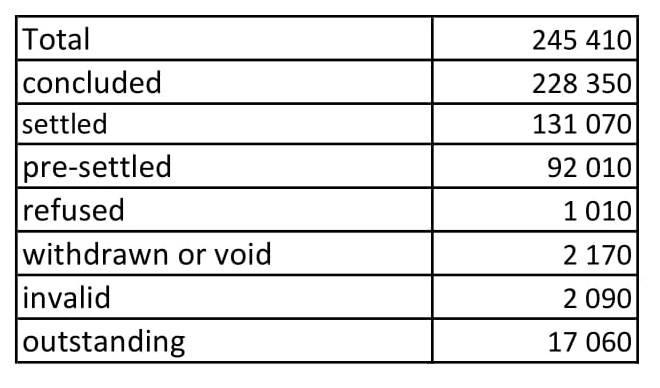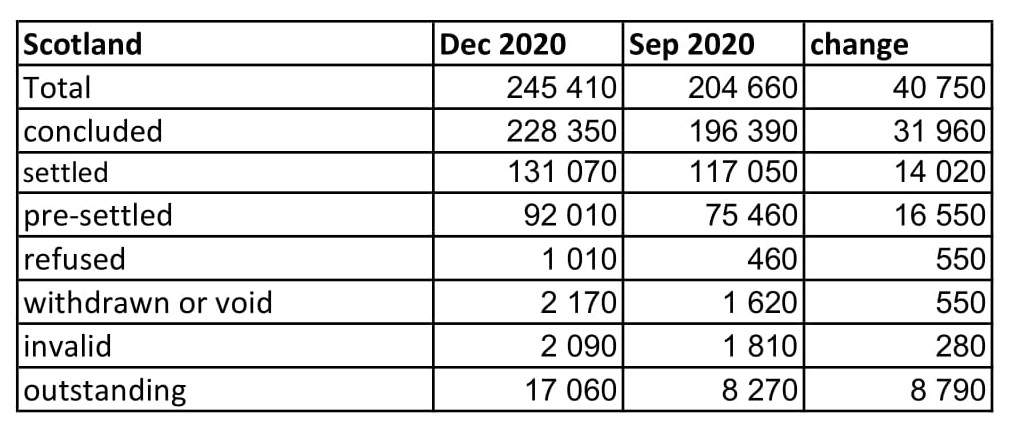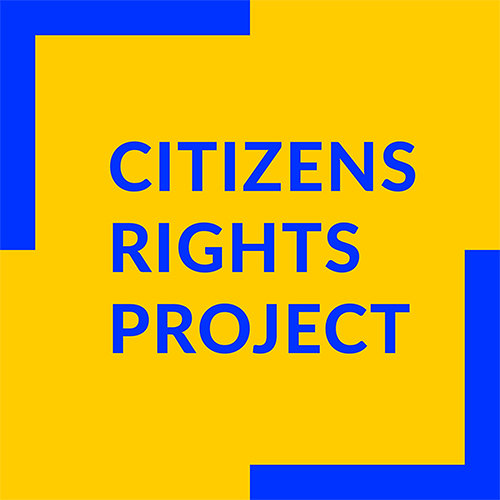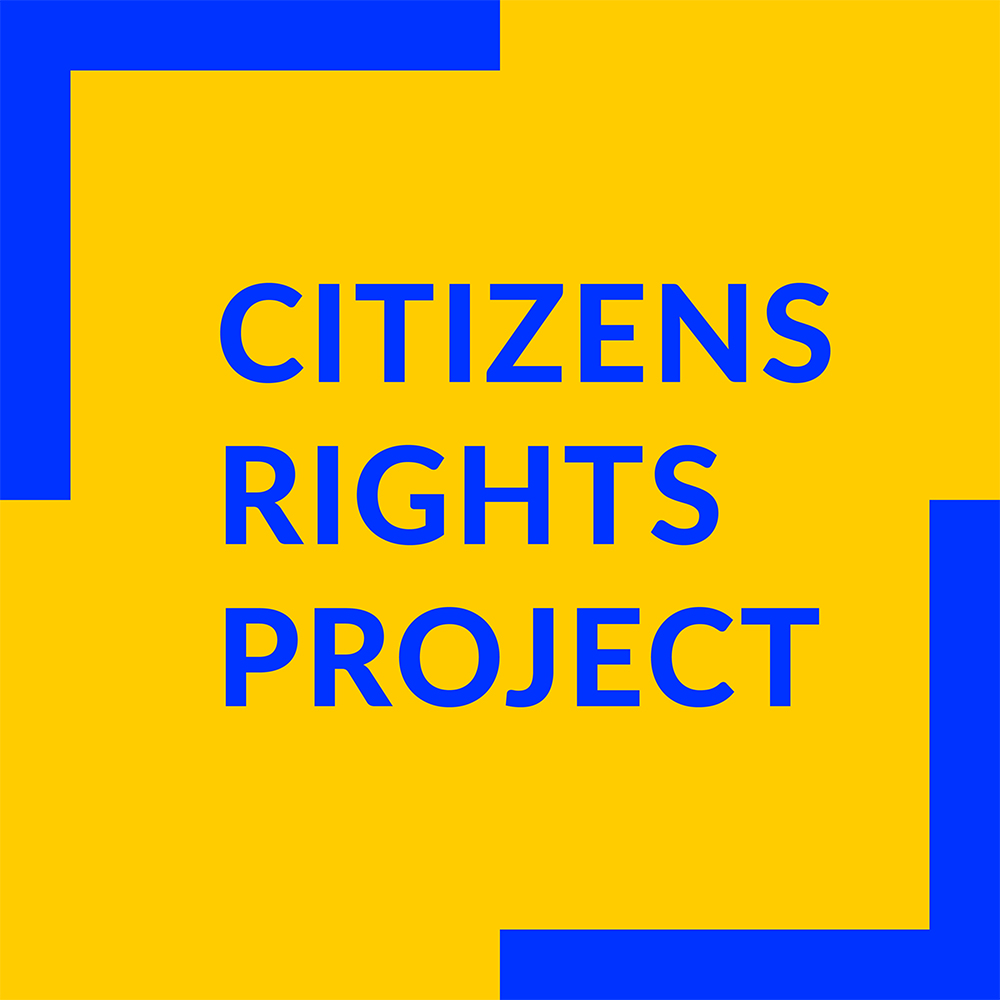EUSS quarterly statistics for December 2020
On 25 February 2021, The Home Office published the latest quarterly information on applications received and cases concluded to the EUSS for local authorities and regions from 28 August 2018 to 31 December 2020. We have decided to have a closer look at the figures for local authorities in Scotland and nationalities that submitted the most applications in each of those local authorities. You can find the tables with the data on applications submitted in Scotland by clicking on the button below:
According to the latest statistics from the Home Office, until 31 December 2020, there have been 245 410 applications to the EU Settlement Scheme submitted in Scotland and 228 070 of them have been concluded.
Out of the concluded applications over 57% of them have resulted with settled status and nearly 41% with pre-settled status. Over 2% of concluded applications have other outcome: 1010 applications were refused, 2170 were withdrawn or voided and 2090 were invalid.
17 060 applications (nearly 7% of all submitted applications) were still outstanding as of 31 December 2020.

In the second sheet of our analysis, we have compared the figures from December 2020 with those from September 2020 and calculated the change in each category of applications. The last 3 months of 2020 were indeed very interesting and busy in the terms of applications submitted. We have decided to point out just a couple of trends in the period mentioned, but we encourage you to have a closer look at the tables and find more details about the EUSS applications in your local authority.

- There was a significant increase in the number of EUSS applications submitted since September 2020. In most of the largely populated areas like Glasgow, Edinburgh, Aberdeen, Dundee, Perth and Kinross, Fife or West Lothian, applications submitted in the last three months of last year accounted for 16-17% of all applications submitted since August 2018. This corresponds with our experience of a high number of queries and requests for support from EU nationals who wanted to apply to the EUSS before the end of December 2020.
- The number of outstanding (not concluded) applications has doubled since September 2020 in most of the local authorities. It could be observed in a large number of enquiries at the beginning of the year from people who had to wait for the Home Office decision longer than usual. This could be explained by the return of the pandemic restrictions in the last quarter of 2020 and the Winter Break season in December, which could result in a slower pace of dealing with the applications by the Home Office. From our experience, there are also more complex cases that require more detailed analysis.
- In the most populated areas like Glasgow, Edinburgh, Aberdeen, Dundee, Perth and Kinross, Fife there were more people granted pre-settled status than settled status between September and December 2020. These numbers refer to concluded applications, so they might not necessarily picture the spike of the number of people coming to the UK in the last-minute just to qualify for pre-settled status. Applications submitted in December 2020 more likely will be seen in the concluded category on the next quarterly statistics. We are expecting to see more pre-settled statuses granted in the early months of 2021.
- There is a worryingly large number of applications with other outcome (refused, withdrawn or void, invalid) in the last 3 months of 2020. It is difficult to point out the reason for this at the moment. Particularly concerning is the fact that in the analysed period there were more applications refused (from the ones submitted in Scotland) than in the time between August 2018 and September 2020.
- Most of the applications submitted in Scotland came from nationals from Central and Eastern Europe, with Poles being the largest applying group in all but one (Shetland) local authorities in Scotland. Romanians are occupying either second or third place in the number of submitted applications in 22 out of 32 local authorities, with further nationalities from that region in the top 5 being Lithuanians, Latvians, Bulgarians and Hungarians (who are the only ones to beat Poles on no 1 in Shetland). From the nationals from Western Europe, the ones with the most applications in Scotland are Italians, Spaniards, French Germans, and on the smaller extend also Portuguese and Dutch. Greeks appear only in few local authorities but the most populated ones, which makes the overall number of applications from these nationals one of the highest.
- Non-EEA nationals submitted 6,990 applications and ranked 13 in Scotland, above many EU nationalities such as Greece, the Netherlands, Slovakia, Slovenia or Czech Republic. This group, along with Bulgarians (Scotland’s sixth largest nationality group applying) can have more negative experiences of the scheme. For example, Non-EEA applicants have the highest negative conclusion rate as a percentage of their concluded applications of any nationality group in Scotland.


